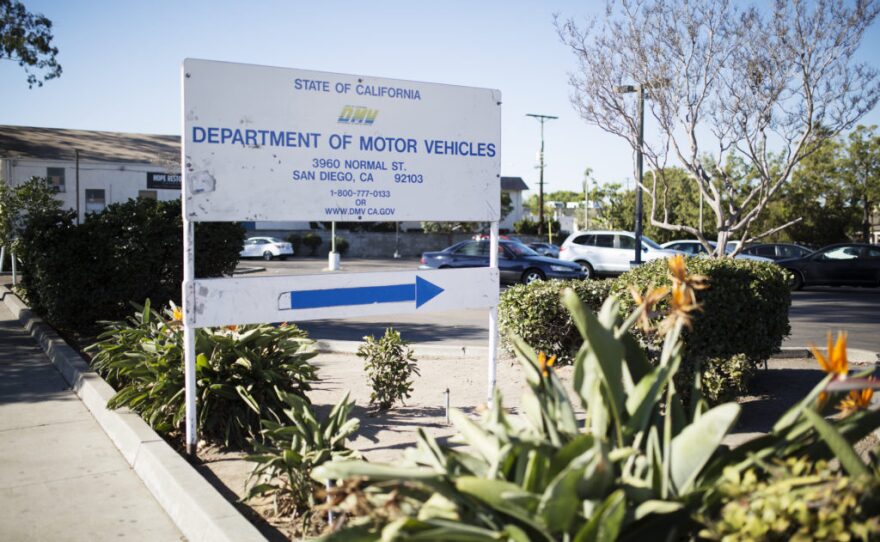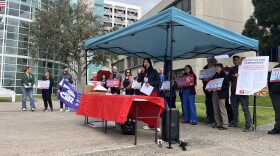
Doctors must report patients diagnosed with any condition marked by a lapse of consciousness, specifically Alzheimer’s disease, so the California Department of Motor Vehicles can check their ability to drive safely. That’s California law.
After all, Alzheimer’s cases are exploding, with an estimated 500,000 new cases a year in the nation.
So, inewsource asked the DMV to disclose how many times it has curbed driver’s licenses because of a patient’s medical condition, what specific actions it took and for which diagnoses.
DMV statistics reveal the agency took action against the licenses of 4,388 to 6,389 drivers with a diagnosis of Alzheimer’s or dementia each year over the last decade, far fewer than the estimated 50,000 people who develop the disease in California annually. It curtailed many more licenses for conditions involving lapse of consciousness, usually related to epilepsy and for various mental disorders.
A lot is at stake. In addition to the danger to impaired drivers and others on the road, doctors who don’t report patients who later cause harm while behind the wheel risk litigation. Lawsuits filed by victims have won big dollar awards.
The DMV did not release the number of restrictions it placed on licenses, such as limiting driving to daylight or within a few blocks from home, which experts say is common.
Curiously, even when doctors do report their patients with Alzheimer’s, a degenerative condition for which there is no cure, the DMV merely suspended licenses of 76 percent rather than revoked them. Since 1997, the DMV put 52 drivers on probation. That means drivers must comply with a prescribed medical regimen and report any changes, and/or agree to have annual medical reports submitted to the DMV.
Where’s the breakdown?
The DMV doesn’t always take action. In an email, DMV spokesman Artemio Armenta said each case is evaluated individually. The DMV reviews the doctor’s report, interviews drivers about their condition and treatment, and may require tests of knowledge, vision and driving.
“Every driver is given due process,” Armenta wrote. Drivers sometimes are mailed a form that their doctors are supposed to fill out.
If the DMV believes someone is a risk, “we will suspend or revoke their driving privilege,” Armenta wrote. But drivers can appeal.
Doctors reluctant to look closely
But doctors and dementia experts say many reports that should be filed never leave the physician’s office for a variety of reasons, mostly because of the time it takes and the possibility that discussions with the patient and family may be unwelcome and uncomfortable.

“Doctors don’t report their patients when they should,” said Dr. Linda Hill, a researcher who leads a UC San Diego program that trains doctors on how and when to screen for and report cognitively impaired patients. “They’re hesitant to bring up driving issues with their patients.”
San Diego neurologist Dr. James Grisolia, a member of several aging drivers task forces, also acknowledged physicians’ reluctance to report.
“It’s very rare for a family doctor to report somebody with dementia; they’ll most often refer to a neurologist and trust the neurologist to do it, and the neurologist may or may not,” he said. Doctors “are terrified to fill out these forms because they think they’re at risk, even though they’re not.”
He spoke of “the average doctor’s hatred and fear of anything that smells of legal risk,” even though not reporting the patient could subject the doctor to civil lawsuits if a patient should drive and hit a person or property.
For many patients, the issue is moot because of other medical issues — they suffered a stroke or are generally very frail — and are physically incapable of getting behind a wheel, he said. Hill said doctors are not required to report those cases.
At some point, many seniors don’t bother to renew because the DMV requires their physical presence when their five-year license expires after they turn 70. The DMV requires them to pass knowledge and vision tests. “And if they’re feeling a little shaky at age 85, and well ... they’re not driving that much anyway and a lot of times people will just sort of let it go,” Grisolia said.
Doctors have little time with their patients, so diagnosing Alzheimer’s or dementia is tough, especially because most patients can “be moderately far along in their disease and still have social graces” that disguise any sign that cognition is slipping, Grisolia said.
What’s critically important is for doctors to listen to patients’ caregivers about what’s going on in the home, when patients aren’t on guarded behavior, he said.
Keeping family out of the exam room
“A few of my colleagues won’t allow the family in the exam room,” Grisolia said. "They want to avoid (hearing) family members tell them 'Grandma’s burning the cookies and leaving the gas on on the stove. We’re afraid she’s going to burn the house down.’”
Ignoring family input, he said, is “always a mistake.”
In practice, Lisa Delano-Wood, clinical director of Memory Aging Resilience Clinic at UC San Diego Health, said the physician reporting “is a big, big tough issue … horrifically understudied and something we face every day.”
Diagnosing a patient with dementia also can provoke major and expensive life changes for patients and families, such as disqualifying them from their assisted living facility.
Other reasons, Wood said, are that doctors “don’t feel they have the expertise or aren’t sure how to screen for Alzheimer’s.”

Lastly, she said, some doctors are just ageists, who incorrectly think memory impairment is just a natural function of aging. “They say, you know, you’re older, your memory is going to be impaired,” Wood said.
The issue is sure to become more visible with more older drivers on the road every year. The California DMV files show that 732,929 more people 65 years and older had driver’s licenses in 2015 than in 2010, the number of drivers 75 and older increased to 108,037 in that period, and 17,702 more drivers 90 and older had licenses.
Hill said DMV officials must strike a balance between “being a heavy-handed punitive agency that overly aggressively takes away a person’s driver’s license, while not incurring the wrath of the public.”
The bottom line, she said, is that doctors, families and public health must grasp the fact that driving is a public safety issue, like use of tobacco or alcohol, and is not a personal right because it affects other people. “And it’s our job to educate the public. It’s about the rights of our community to be safe.”






